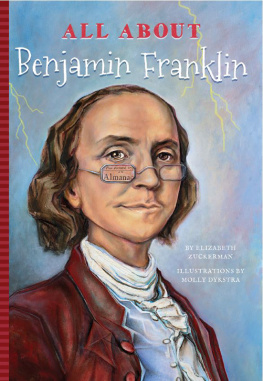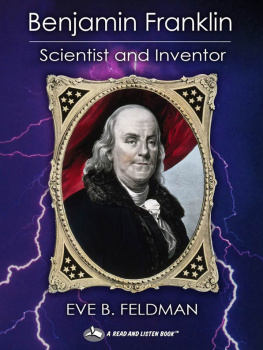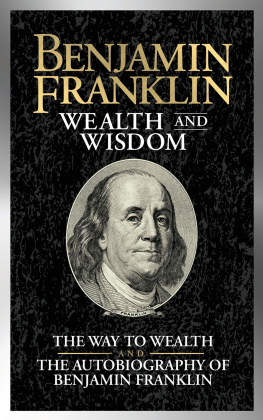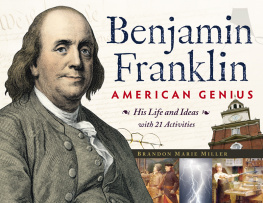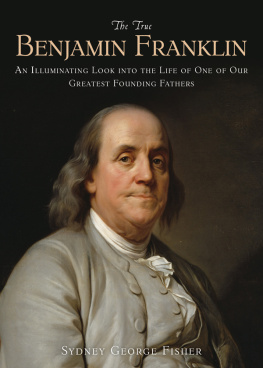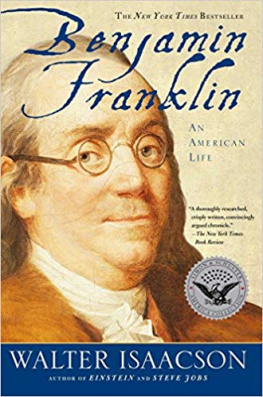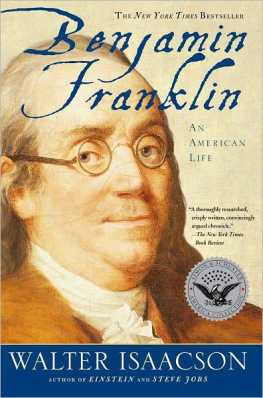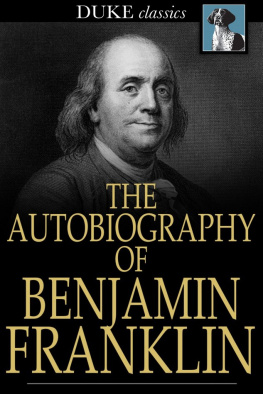All About
Benjamin Franklin
Elizabeth Zuckerman

All About Benjamin Franklin
Copyright 2016 by Elizabeth Zuckerman
Published by Blue River Press
Indianapolis, Indiana
www.brpressbooks.com
Distributed by Cardinal Publishers Group
Tom Doherty Company, Inc.
www.cardinalpub.com
All rights reserved under International and
Pan-American Copyright Conventions.
No part of this book may be reproduced, stored in a database or other retrieval system, or transmitted in any form, by any means, including mechanical, photocopy, recording or otherwise, without the prior written permission of the publisher.
ISBN: 978-1-68157-092-1
EISBN: 978-1-68157-109-6
Author: Elizabeth Zuckerman
Series Editor: Charleen Davis
Editor: Dani McCormick
Interior Illustrator: Molly Dykstra
Cover Artist: Jennifer Mujezinovic
Cover Design: David Miles
Book Design: Dave Reed
Printed in the United States of America
Dedicated to My Parents
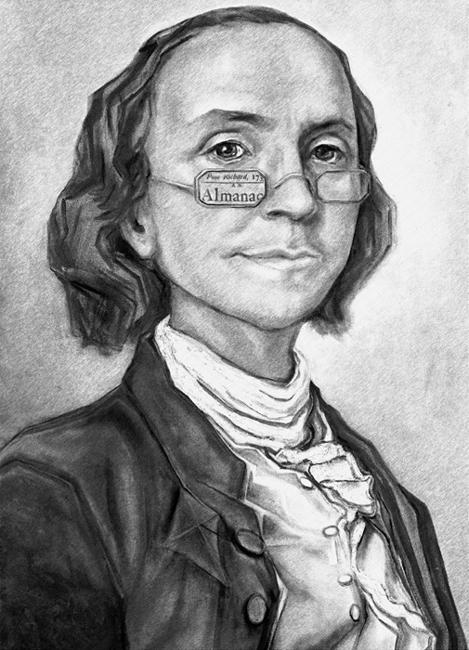
Young Ben Franklin could only imagine
how he would change history
All About
Benjamin Franklin
Preface
Ben Franklin was one of Americas greatest Founding Fathers: a printer, scientist, and statesman who shaped the fate of our country. Born into a working-class family, he made his way with wits and talent rather than money and connections. His discoveries and inventions made him a celebrity in his own time. Queens and lords recognized his face as easily as we do today. For many people, then and now, he embodies the best of American ingenuity, spirit, and cleverness.
But Ben never wanted the spotlight. At an early age, he decided that the best way to live was not by being admired, but by being useful. Where other people would shake their heads in despair, Ben could always find a new and creative solution in arenas ranging from politics to science to indoor heating. He built his many successful careers by finding new and better ways to improve life, whether by starting his own business, protecting houses from fire and lightning, or even by championing an infant nation as it struggled to find its place in the world. If he believed in a cause, he never stopped fighting for it.

Philadelphia, a relatively young city, had a booming economy and plenty of opportunities for a young man like Ben to make a name for himself
During his lifetime, which spanned eighty-four of Americas most turbulent years, Ben was always on the front lines of change. At seventeen, he ran away to the fastest growing city in his homeland, Philadelphia. His experiments with electricity challenged the accepted wisdom of the time. He saw thirteen colonies defy the greatest army Europe had to offer, and did all he could to help them succeed. By doing so, he and the other Founding Fathers put their lives in danger. If the American Revolution had failed, Ben and his fellow rebels would have been executed as traitors to the English crown. To Ben, the risk was worth it to do the right thing.
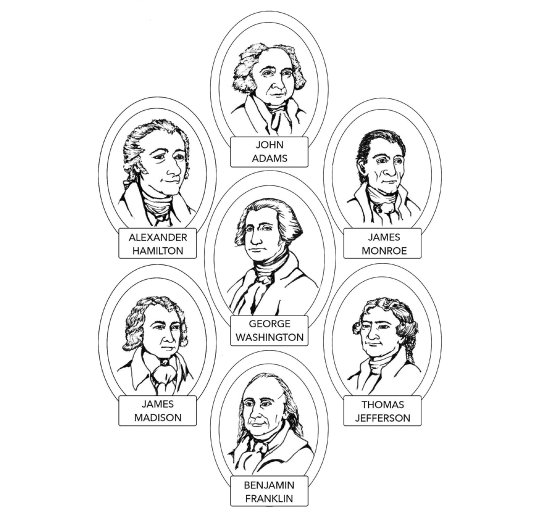
Benjamin Franklin was one of the countrys memorable Founding Fathers
Not only was he brave, but he was also a visionary thinker. He spoke out against slavery and prejudice against Native Americans. His witty quips, which based their jokes in human nature, are as true today as they were when he wrote them. He founded dozens of organizations, many of which are still active today. And the country for which he worked so tirelessly has only admired him more with time. From fire departments to libraries to universities, from student scholarships to nationally recognized centers of scientific learning, Bens legacy continues to shape America, more than two centuries after his death.
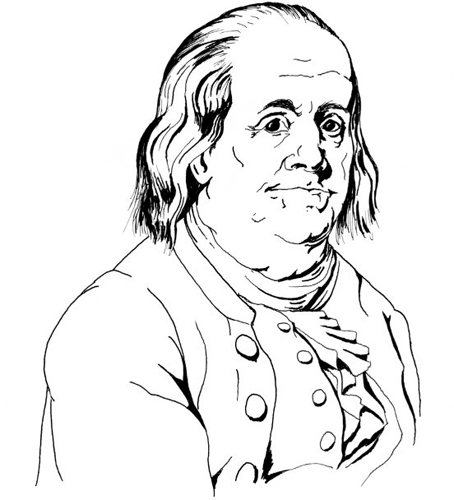
This popular painting of Ben is the most recognizable because it was chosen for the $100 bill
Chapter One
Growing Up
America in 1706 was not yet a country, but a set of territories called colonies, populated by English settlers and loosely connected by their loyalty to England. The oldest English colony was Virginia, founded ninety-nine years earlier in 1607. Twenty-one years after Virginia was founded, the Puritans founded the Massachusetts Bay colony. Ben Franklin was born in Boston, Massachusettss largest city, in 1706.
Bens father, Josiah, had been born in England, and came to Boston in 1682 with his wife Anne and three children. After Anne died in childbirth with their seventh child, Josiah married Bens mother, Abiah Folger. Josiah was the first in his family to come to America, but Abiahs father had been one of New Englands first settlers. Ben was their eighth child, the youngest son, and with only two sisters after him, the third-youngest Franklin. Josiah and Annes second son had died in infancy, but all the other young Franklinsnine boys and seven girlsgrew to adulthood.
At age sixty-five, Ben could remember thirteen Franklin children gathered around the dinner table at one time. Of his many siblings, Ben was closest with his sister Jane, born six years after him and the youngest of his siblings. Both Ben and Jane had very fond memories of their childhood and of their parents, who worked very hard to feed and care for their children.
A huge family like the Franklins would have been hopelessly crowded in England, where the lands were already settled and the jobs already taken. In the American colonies, which English settlers had occupied for less than a century, there was plenty of room for each Franklin son to learn his own trade. Girls in this day learned housekeeping by helping their mothers with the never-ending work of keeping up a house, but boys typically were apprenticed to a local tradesman or learned from their fathers.
Josiah Franklin, who encouraged his children to be honest, thoughtful, and hard-working, required each of his sons to learn a useful business. His fourth son John followed in his fathers footsteps and became a candle maker, or chandler; James, the sixth son, had a printing shop. Ben himself went to school at age eight because Josiah hoped that Ben would become a churchman. Ben loved reading and soon rose to the top of his class, but the school was too expensive, and his father brought him home to learn the family trade of candle making when Ben was ten years old.
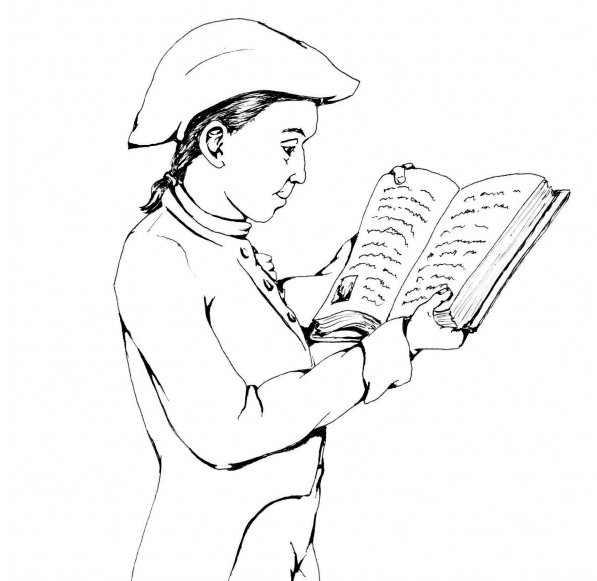
Ben loved reading as a child and quickly exhausted his fathers small library
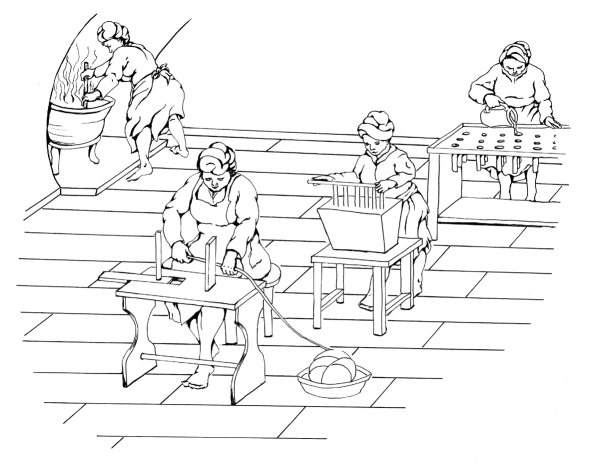
Chandlers were very important before electrical lighting and worked long hours in hot conditions
Chandlers worked long and tedious hours over large vats of hot wax and tallow. When they werent pouring the tallow into molds, they were sweating over pots of it boiling down into soap. Although he loved his father, Ben didnt like the job. He would much rather have gone to sea.
Next page
